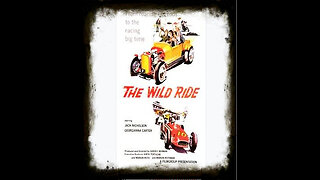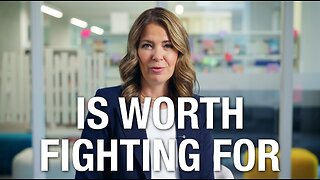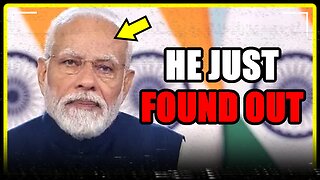Premium Only Content

The Last Time I Saw Paris 1954 | Vintage Full Movies | Classic Romance Movies | Classic Drama Movies
The Last Time I Saw Paris is a 1954 Technicolor romantic drama made by Metro-Goldwyn-Mayer. It is loosely based on F. Scott Fitzgerald's short story "Babylon Revisited." It was directed by Richard Brooks, produced by Jack Cummings and filmed on locations in Paris and the MGM backlot. The screenplay was by Julius J. Epstein, Philip G. Epstein and Richard Brooks.
The film starred Elizabeth Taylor and Van Johnson in his last role for MGM, with Walter Pidgeon, Donna Reed, Eva Gabor, Kurt Kasznar, George Dolenz, Sandy Descher, Odette, and (a then-unknown) Roger Moore in his Hollywood debut. The film's title song, by composer Jerome Kern and lyricist Oscar Hammerstein II, was already a classic when the movie was made and inspired the movie's title. Though the song had already won an Oscar after its film debut in 1941's Lady Be Good, it is featured much more prominently in The Last Time I Saw Paris. It can be heard in many scenes, either being sung by Odette or being played as an instrumental.
Plot:
As World War II ends in Europe, Stars and Stripes journalist Charles Wills is on the streets of Paris, covering the celebrations. He suddenly is grabbed by a beautiful woman, who kisses him and disappears. Charles follows the crowd to Café Dhingo and meets another pretty woman named Marion Ellswirth. The mutual attraction is instant, and she invites him to join her father's celebration of the end of the war in Europe. Charles, Marion and her persistent French suitor Claude Matine arrive at the Ellswirth household, and we find that the woman who had kissed Charles is Marion's younger sister Helen.
Their father, James Ellswirth, had survived World War I and promptly joined the Lost Generation. Unlike most drifters, he never grew out of it, raising his two daughters to desire such a lifestyle. Helen takes after her father and uses her beauty to sustain a life of luxury even though they are flat broke. Marion goes the other way and looks for serious-minded and conventional young men such as Claude, an aspiring prosecutor, and Charles, the future novelist.
Charles and Helen start dating and fall in love. After Helen recovers from a near-death case of pneumonia, they get married and settle in Paris. James good-naturedly joins the happy family of Charles, with Helen eventually having a daughter, Vickie. Marion, having lost Charles to Helen, agrees to marry Claude. Charles struggles to make ends meet with his meager salary, unsuccessfully works on his novels and looks after Vickie.
At about this time, the barren oil fields in Texas that James had bought years before finally begin to produce. Charles, to whom James had given the oil fields as a dowry, quits his job, and Helen and James begin to host parties instead of going to them. Sudden wealth changes Helen, who becomes more responsible, and Charles parties his wealth away after quitting his newspaper job and having all his novels rejected by publishers. They also each start to pursue other interests: Helen flirts with handsome tennis player Paul Lane, and Charles competes in a local Monte Carlo-to-Paris race with professional divorcee Lorraine Quarl.
After the race, Charles returns to Paris, only to find Helen sitting in Café Dhingo with Paul. A fight breaks out between Paul and Charles, and an angry Charles goes home first and puts the chain on the door, preventing it from being opened all the way. When Helen comes home and tries to enter she can't. She calls out to him, but Charles is in a drunken stupor on the staircase, and the bottle drops from his hands as Helen calls. Helen has to walk all the way to her sister's in the snow and rain. She catches pneumonia again and dies.
Marion petitions for and gets full custody of Vickie, and Charles returns home to America. A few years later, having straightened himself out, published a book, and stopped boozing, Charles returns to Paris, hoping his reform will persuade Marion to give Vickie back to him. Charles tells Marion that he only has one drink a day now. Marion refuses, still feeling resentful towards Charles' having fallen for Helen instead of her and for his being responsible for Helen's death. Seeing that Charles and Vickie belong together, Claude steps in and tells Marion that she is punishing Charles for his not realizing that Marion loved him, but marrying Helen instead, and the penalty for it is taking away the only thing he had left: his own daughter. Claude asks Marion to accept him and wanting their own child out of love and not out of defeat (as a result of Charles allowing Helen to die).
Marion goes into Café Dhingo (on whose main wall is a big picture of Helen) to look for Charles (who is gazing at the painting) and tells him that Helen would not have wanted him to be alone. Outside the cafe, Claude is with Vickie. The child runs to Charles, and Charles and the child walk away together.
Source - Wikipedia
#VintageDramamovies #VintageconnoisseurPresents #ClassicRomanceMovie
Please Like and Subscribe! https://www.youtube.com/channel/UCBWs8bvBOk36ccEODelS
Etsy Store: http://www.etsy.com/shop/VintageConnoisseur
-
 59:05
59:05
VintageConnoisseur Presents
2 years agoThe Wild Ride 1960 | Classic Adventure Drama | Sports Drama | Vintage Connoisseur Presents
364 -
 1:04:36
1:04:36
Dialogue works
3 days ago $3.66 earnedMohammad Marandi: Iran Just Gave Israel a FINAL Warning…
16.3K6 -
 9:20
9:20
daniellesmithab
1 day ago3 Bad Laws
18.9K7 -
 9:22
9:22
MattMorseTV
18 hours ago $11.18 earnedINDIA just made a BIG MISTAKE.
62K57 -
 12:11
12:11
Nikko Ortiz
17 hours agoCrashout 6 Rumble
15.5K3 -
 22:35
22:35
GritsGG
17 hours agoThe KILO is BACK! The Best AR on Warzone FRIES!
24K1 -
 2:16:36
2:16:36
Side Scrollers Podcast
20 hours agoStreamer KICKED OUT of Renaissance Fair for Misgendering + Spiderman MELTDOWN | Side Scrollers Live
46.1K8 -
 12:29
12:29
The Pascal Show
1 day ago $2.18 earnedLOCKED IN A DUNGEON?! Parents Arrested After 5 Children Found In 'Dungeon' At Home
17.5K3 -
 LIVE
LIVE
Lofi Girl
2 years agoSynthwave Radio 🌌 - beats to chill/game to
332 watching -
 3:07:24
3:07:24
FreshandFit
12 hours agoPrivileged Nigerian Thinks Women Created Everything: HEATED DEBATE
155K93